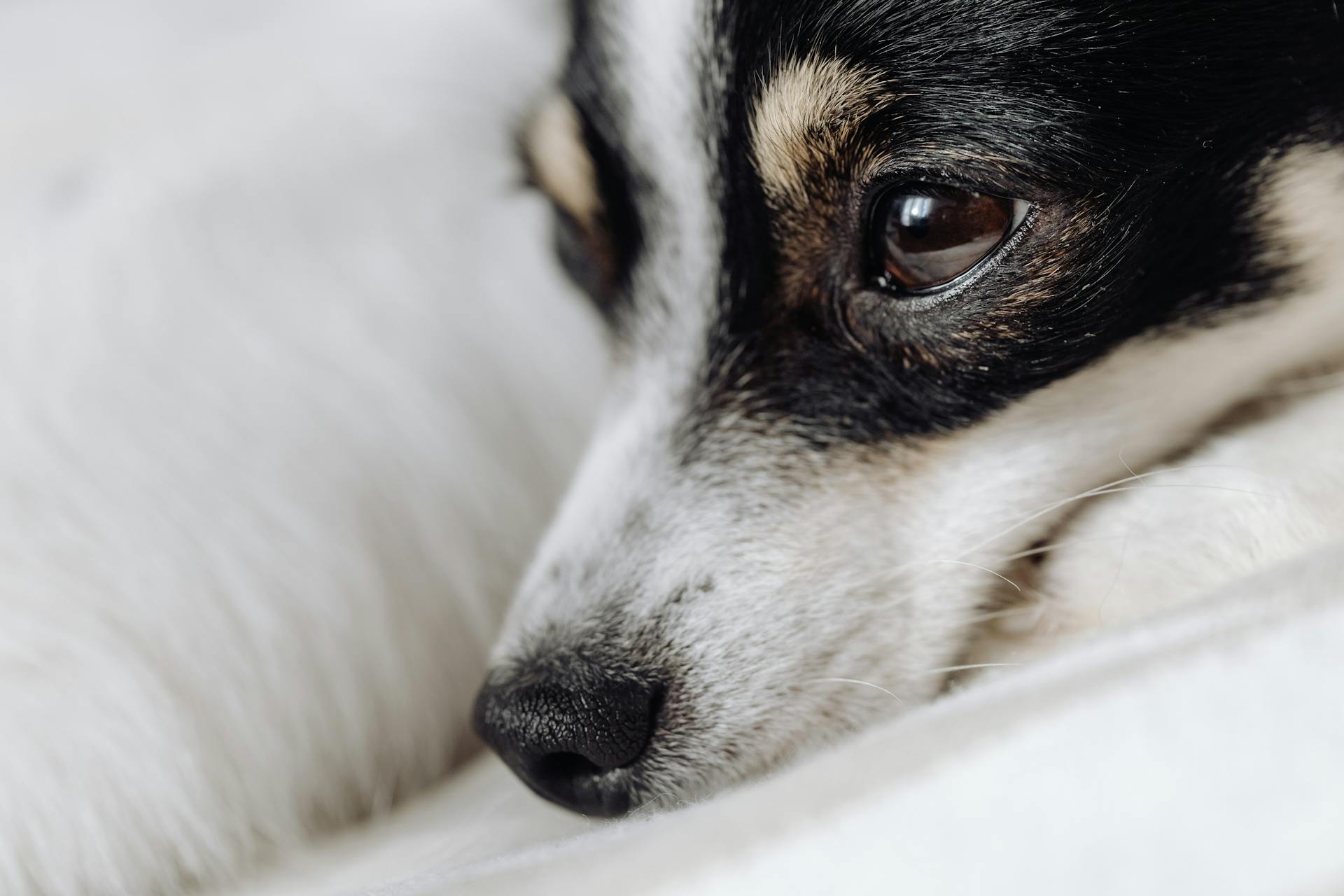
Kennel cough is a highly contagious respiratory infection that can affect dogs of all ages, but it's most common in puppies and unvaccinated dogs.
If left untreated, kennel cough can lead to serious complications, such as pneumonia, which can be life-threatening.
Symptoms of kennel cough include a persistent cough, which can be dry and hacking or produce mucus, as well as sneezing, runny eyes, and loss of appetite.
In severe cases, kennel cough can cause dogs to develop secondary bacterial infections, which can lead to more serious health issues.
The incubation period of kennel cough is typically 2-14 days, during which time a dog may appear healthy but is still contagious to other dogs.
For your interest: Kennel Cough Spread to Humans
What Is Kennel Cough?
Kennel cough is a contagious respiratory infection that affects dogs of all ages, caused by a combination of viruses and bacteria, including Bordetella bronchiseptica and parainfluenza virus.
Symptoms can vary in severity, but common signs include a persistent, dry, hacking cough, often accompanied by sneezing, runny nose, and loss of appetite.
The cough is usually the most noticeable symptom, and it can be loud and persistent, sounding like a goose honking.
Bordetella bronchiseptica is a major contributor to the development of kennel cough, and it's highly contagious, spreading through the air when an infected dog coughs or sneezes.
In severe cases, kennel cough can lead to secondary infections, such as pneumonia or bronchitis, which can be life-threatening if left untreated.
Dogs with weakened immune systems, such as puppies, older dogs, and dogs with underlying health conditions, are more susceptible to kennel cough and its complications.
Causes and Risk Factors
Kennel cough in dogs can be caused by multiple bacteria and viruses, including Bordetella bronchiseptica, canine adenovirus, and parainfluenza virus.
These pathogens can be spread through respiratory secretions, such as coughing or sneezing, and can also be contracted from infected objects like shared toys or food bowls.
Dogs are typically exposed to kennel cough in crowded areas, including animal shelters, boarding kennels, dog daycare facilities, and dog parks.
Dogs that spend time with other dogs are at a higher risk of developing kennel cough, especially those that attend dog shows, travel frequently, or stay at kennels.
Here are some high-risk environments for kennel cough:
- Animal shelters
- Boarding kennels
- Dog daycare facilities
- Grooming facilities
- Dog parks
Symptoms and Diagnosis
Kennel cough is a persistent, forceful cough that sounds like a goose honk, and it's a classic symptom of the illness. It's distinct from a reverse sneeze, which can be normal in certain dogs and breeds.
Some dogs with kennel cough may show other symptoms of illness, including sneezing, a runny nose, or eye discharge. These symptoms can be a sign that the dog needs veterinary attention.
A diagnosis for kennel cough can be made based on the dog's symptoms, history, and response to therapy. Diagnostic testing is recommended for dogs where pneumonia is suspected, dogs that do not respond to supportive care, dogs with signs of systemic disease, or if an outbreak is occurring in multiple dogs.
What Is Kennel Cough Untreated?
Kennel cough untreated can be quite severe. It's a bacterial or viral infection that affects the upper respiratory tract of dogs, causing a persistent cough.
The cough can last for weeks or even months if left untreated. In some cases, it can be a sign of a more serious underlying condition.
Coughing can lead to dehydration in dogs, especially if they're not drinking enough water. This can cause symptoms such as dark urine and a decrease in appetite.
Untreated kennel cough can also lead to secondary infections, such as pneumonia. This can be life-threatening in severe cases.
Dogs with kennel cough may experience difficulty breathing, especially after exercise or playtime. This is because the infection can cause inflammation in the airways.
If you suspect your dog has kennel cough, it's essential to seek veterinary care as soon as possible. Early treatment can help alleviate symptoms and prevent complications.
A unique perspective: Can Allergies Cause Swollen Lymph Nodes in Dogs
Signs and Symptoms
The signs and symptoms of kennel cough can be quite distinct. A persistent, forceful cough that sounds like a goose honk is the classic symptom.
This cough is often accompanied by sneezing, a runny nose, or eye discharge. Some dogs may also develop conjunctivitis, rhinitis, or a nasal discharge.
A dry-sounding, spasmodic cough is the primary sign of kennel cough, caused by inflammation of the trachea and bronchi. At the end of a coughing spell, a dog will often retch and cough up a white foamy discharge.
On a similar theme: Kennel Cough Nose Discharge

Other symptoms can include hacking, wheezing, and depressed behavior. If your dog has nasal discharge, is breathing rapidly, refuses to eat, or seems lethargic, take them back to the veterinarian right away.
Here are some common symptoms of kennel cough:
- Coughing
- Sneezing
- Runny nose
- Loss of appetite
- Decreased energy level
- Conjunctivitis (inflammation of the membrane lining the eyelids)
- Hacking
- Wheezing
- Depressed behavior
It's essential to isolate your dog from other dogs to prevent spreading the virus, and to provide support care to help your dog recover. This can include making sure your pet is eating, drinking, and in a stress-free environment.
How Veterinarians Diagnose
Diagnosing kennel cough in dogs is a relatively straightforward process, but it does require some detective work. Veterinarians typically make a diagnosis based on a dog's symptoms, history, and response to therapy.
A dog's symptoms are the most obvious clue to diagnosing kennel cough. If your dog is coughing, sneezing, or showing signs of pneumonia, your veterinarian will take a closer look.
However, in some cases, identifying the underlying bacteria or virus is not necessary for a diagnosis. This is because kennel cough is often caused by a combination of factors, including viruses and bacteria.
Broaden your view: Kennel Cough Bacteria
If your veterinarian suspects pneumonia, they will recommend diagnostic testing. This is because pneumonia can be a serious condition that requires prompt treatment.
In addition to pneumonia, diagnostic testing is also recommended for dogs that don't respond to supportive care. This means that if your dog's symptoms persist or worsen despite treatment, your veterinarian may want to run some tests to determine the underlying cause.
Dogs with signs of systemic disease, such as fever or lethargy, may also require diagnostic testing. This is because systemic disease can be a sign of a more serious underlying condition.
If an outbreak is occurring in multiple dogs, diagnostic testing may be necessary to determine the source of the outbreak. This can help prevent further spread of the disease.
Here are some scenarios where diagnostic testing is recommended:
- Dogs where pneumonia is suspected
- Dogs that do not respond to supportive care
- Dogs with signs of systemic disease
- If an outbreak is occurring in multiple dogs
How Long Does It Last?
Most dogs with kennel cough recover completely within 1 to 3 weeks.
Dogs that are older or have other medical conditions may take up to 6 weeks to recover.
It's essential to follow up with your veterinarian if your dog doesn't improve within the expected amount of time.
If your dog shows symptoms of rapid breathing, not eating, or listlessness, contact your vet right away, as these could be signs of more serious conditions.
Treatment and Management
If your dog has kennel cough, a proper veterinary examination and appropriate diagnostics must be performed before any treatment.
A veterinarian will likely prescribe an antibiotic to prevent secondary bacterial infection.
A cough suppressant may also be prescribed to help manage symptoms.
It is imperative that you follow the treatment regimen as directed by your veterinarian to ensure the best possible outcome for your dog.
Treatment
If your dog is suspected to have kennel cough, antibiotics may be prescribed to prevent secondary bacterial infections.
A cough suppressant may also be prescribed to help manage your dog's symptoms.
A proper veterinary examination and diagnostics are crucial before any treatment regimen is administered.
Recovery and Management
As your dog recovers from kennel cough, it's essential to create a comfortable environment to aid in their healing. Household cleaners, cigarette smoke, and dust can all cause irritation and prolong your dog's recovery.
Avoid using a collar and leash during walks, as this can put extra pressure on the trachea, inducing coughing. Harnesses are a great alternative, as they distribute the force more evenly.
Keep an eye on your dog's surroundings and make sure they're not exposed to any irritants that might make their recovery more difficult.
Prevention and Vaccination
There are three forms of vaccine for kennel cough: one that is injected underneath the skin, one that is delivered as a nasal mist, and one that can be given by mouth.
Fully vaccinated dogs can still get kennel cough, but vaccination may help keep your pet protected.
The intranasal and oral kennel cough vaccinations are typically given to dogs once a year, but sometimes are recommended every 6 months for dogs at high risk for kennel cough.
These forms of the vaccine tend to provide dogs protection against kennel cough sooner than the injected product.
Some pet parents may elect to skip vaccinating for kennel cough because their pet never has exposure to other dogs, but the vaccine comes in many forms, including an oral liquid.
It’s very safe with little side effects and no injection with a needle required.
The bordetella vaccine can be administered orally, intranasal or injected, and typically will be given in two separate doses two to four weeks apart, and then as a booster every six months to a year.
You should speak to your veterinarian to determine which vaccine is right for your pet, and how often they should receive them.
Worth a look: One Dog Has Kennel Cough the Other Doesn't
Costs and Insurance
Treating kennel cough can be expensive, with costs ranging from $75 to $200, including examination and medication fees.
The cost of treatment can increase if your dog requires more extensive testing, such as blood work or x-rays, which can add $200 to $500 to the bill.
Having your dog vaccinated against kennel cough is a more cost-effective option, with the bordetella vaccine averaging $10 to $15 for a one-time vaccination or $20 to $30 for two vaccinations.
The parainfluenza shot costs vary around $7 to $32, and is often given in a combined "five-in-one" shot called the DA2PP or DHPP series, which protects against kennel cough and other diseases.
The DA2PP vaccine typically costs about $20 to $60 per vaccine, with the series costing about $150 on average, not including examination fees.
Coverage for kennel cough can vary among different pet insurance policies, so it's essential to review each plan carefully before choosing a policy for your pet.
Take a look at this: Kennel Cough Injection Cost
Frequently Asked Questions
When should I be worried about kennel cough?
Contact your vet if your dog's cough persists for more than 7 days, especially if it's a puppy or elderly dog. If left untreated, kennel cough can lead to complications, so don't wait to seek advice.
Sources
- https://www.webmd.com/pets/dogs/kennel-cough-in-dogs
- https://www.americanhumane.org/fact-sheet/kennel-cough/
- https://www.petmd.com/dog/conditions/respiratory/kennel-cough-dogs-symptoms-and-treatments
- https://callananveterinarygroup.com/what-is-kennel-cough/
- https://www.forbes.com/advisor/pet-insurance/pet-care/kennel-cough-in-dogs/
Featured Images: pexels.com


